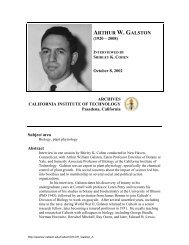Interview with David Baltimore - Caltech Oral Histories
Interview with David Baltimore - Caltech Oral Histories
Interview with David Baltimore - Caltech Oral Histories
Create successful ePaper yourself
Turn your PDF publications into a flip-book with our unique Google optimized e-Paper software.
<strong>Baltimore</strong>-64<br />
BALTIMORE: No, it was largely NIH, some CDC [Centers for Disease Control and Prevention].<br />
There are twenty-three institutes in NIH. It was in three or four of those institutes. The major<br />
program was in NIAID, the National Institute of Allergy and Infectious Diseases, but there were<br />
programs in the Cancer Institute and other institutes.<br />
LIPPINCOTT: Were they mostly devoted to looking for ways to make a vaccine<br />
BALTIMORE: No. This was before we had drugs, so—<br />
LIPPINCOTT: Oh, like AZT<br />
BALTIMORE: Yes, that’s right. I don’t remember when AZT came. We needed to characterize<br />
drug targets, we needed to make drugs. We needed to make a vaccine—vaccine was a central<br />
issue. And we needed to find out more about the properties of the virus. We needed a research<br />
program that was going to characterize every little nook and cranny of the virus, so we could find<br />
out where it was vulnerable. And that’s what’s happened.<br />
LIPPINCOTT: Do you want to talk about the prospects now for an AIDS vaccine, just a little bit<br />
BALTIMORE: An AIDS vaccine is—I have always said, and I said it in ’86 and have said it<br />
continually since then—that an AIDS vaccine is at least ten years away.<br />
LIPPINCOTT: Sounds like what they say about fusion.<br />
BALTIMORE: Exactly. It’s very similar to that, but that’s, like, twenty years away. Basically ten<br />
years is as far as anybody can look, and that means that there is no vaccine on the horizon. But it<br />
may not be ten years anymore, because we have made a little bit of progress. There was just a<br />
trial which had, maybe, a positive signal in it. I mean, just on the borderline of positive, and<br />
people will argue about it.<br />
LIPPINCOTT: Is the difficulty that the virus is so mutable

















